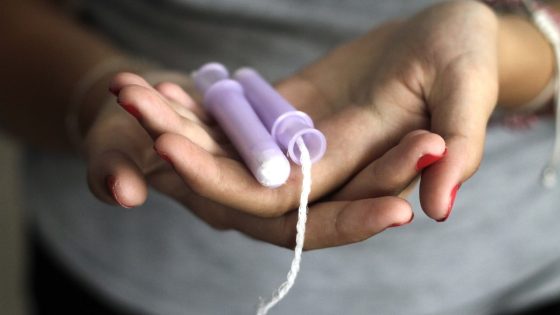Raising concern about menstrual products, a study has detected a number of toxic metals – including lead and arsenic – in tampons widely used in the US and Europe.
Tampons are essentially cotton and/or rayon/viscose plugs inserted vaginally to absorb and retain menstrual blood. An estimated 52 to 86 percent of menstruators in the United States use tampons. However, sanitary pads dominate the period product market in India. Nevertheless, other products like tampons and menstrual cups are also gaining popularity, especially among urban dwellers.
About the study
The study, conducted by the University of California, Berkeley, analysed 60 samples of tampons from 14 brands to determine the levels of metals present. The products were purchased from stores in the US, UK, and Greece, as well as from two major online retailers. They were further analysed to determine concentrations of arsenic, barium, calcium, cadmium, cobalt, chromium, copper, iron, manganese, mercury, nickel, lead, selenium, strontium, vanadium, and zinc. The researchers found measurable concentrations of all 16 metals assessed.
While lead was found in all the tested tampons, all 16 metals were detected in at least one sample. However, the research does not mention any brand names.
The study noted that lead is associated with numerous adverse neurological, renal, cardiovascular, hematological, immunological, reproductive, and developmental effects.
“Even low-level exposure to lead can result in neurobehavioral impacts in adults and children, including decreased cognitive function such as impaired attention, memory, and learning ability,” it stated. Researchers also mentioned arsenic and cadmium’s association with several adverse health outcomes.
The concentration of metals varied in organic and non-organic tampons. The organic ones contained less lead but more arsenic than the non-organic variants.
Should you be worried?
Does it mean you should throw away all those tampons? Well, the study doesn’t mention if the metals leach out of tampons and are absorbed by the body.
According to Jenni Shearston, a postdoctoral scholar at the University of California Berkeley School of Public Health and the lead author of the study, they just know that metals are present in all the samples they tested.
“However, we do not know yet if metals leach out of the tampon and whether they are absorbed by the body. We therefore cannot yet assess to what extent (if any) metals in tampons contribute to any health problems,” she told CBS News.
Further studies are required to determine if metals leach out, which can be troublesome because the vagina’s skin is more permeable than other body parts. The Food and Drug Administration, which regulates tampons in the US, has said it plans to evaluate the study closely and take any action warranted to safeguard the health of consumers who use these products.
Although this study does not evaluate the health risks from tampon use, previous research on heavy metals in cosmetics has suggested the potential for dermal absorption of metals such as lead.
What do gynaecologists say?
Gynaecologists admit to the potential health risks caused by the metals found in the tampons in the recently published study but also acknowledge the limitations of the research. Health experts, however, do suggest taking a cautious approach.
“Although the full impact of the presence of these metals in tampons on health is still not completely understood, this study indicates the need for caution,” says Dr Tripti Raheja, lead consultant, obstetrics and gynaecology at the CK Birla Hospital, Delhi.
“Lead exposure can lead to neurological damage, and arsenic is associated with various health risks, including cancer. Although the vaginal tissue is highly absorbent (which means these metals can enter the bloodstream directly and cause adverse health effects), we still do not have any clarity regarding the concentration of toxic metals in tampons and whether these metals can be absorbed through the vagina in a significant amount to cause adverse health effects,” Dr Raheja adds.
She suggests considering alternative menstrual products or reducing tampon use while further research is conducted to clarify the risks.
Dr Astha Dayal, director, obstetrics and gynaecology, CK Birla Hospital Gurugram, agrees and says it is too early to conclude that tampons are harmful.
“Tampons are inserted in the vagina, which has a lot of blood flow. This allows for the direct absorption of certain chemicals into the bloodstream. Unlike oral products that first go through the gut and are then cleared out by the liver before reaching the blood—a process called first-pass metabolism—substances placed in the vagina bypass this and enter the bloodstream directly. However, it is not yet clear how much lead, arsenic, or other metals are absorbed this way, what their blood levels are, and whether these levels are toxic. More research is needed,” Dr Dayal says.
Dr Neelam Suri, senior consultant obstetrician and gynaecologist, Indraprastha Apollo Hospital, New Delhi, meanwhile, says that stopping the use of tampons entirely might not be necessary but it is crucial to consider alternative menstrual products that are safer and more environmentally friendly.
She adds that tampon use is limited in India, where sanitary pads or cloth are more commonly used due to various reasons, including accessibility.
Tampons – the pros and cons
Apart from the presence of metals (which rings an alarming bell but needs further study), there are several cons of using tampons. “It can be difficult to use for untrained young girls, which can cause injuries. The risk of Toxic Shock Syndrome (TSS) is higher with tampons, as they can cause irritation and itching as well,” says Dr Prajakata Jadhav, gynaecologist, Saraswati Hospital, Ahmednagar, Maharashtra.
If you leave a tampon in for too long, it can cause TSS, which happens when bacteria enter the body and release harmful toxins. Though it is rare, it can be fatal. One should avoid using tampons at night while sleeping. High-absorbent tampons can also cause vaginal dryness.
“Besides this, tampons are expensive and not environmentally friendly,” adds Dr Dayal.
However, tampons have certain advantages as well, like not causing rashes (like pads can) and keeping you feeling comfortable during periods.
Each of the products has its pros and cons. Like pads are accessible and cheap but can cause rashes and are not environmentally friendly. Menstrual cups, on the other hand, can leak if not fitted properly.
Health experts recommend menstrual cups made with medical-grade silicone and cloth pads.
“Reusable menstrual cups are a great option as they are free from chemicals and can be washed and reused. Cloth pads are another alternative that is biodegradable and reduces waste. These products not only minimise exposure to toxic metals but also support sustainable menstrual hygiene practices,” says Dr Suri.
Owing to the recent study, you may exercise caution towards tampons but experts warn against panicking. “Till the studies regarding actual absorption are out and proven, we can still continue using tampons,” says Dr Sujit Ash, consultant, gynaecology and obstetrics, PD Hinduja Hospital and MRC, Mumbai.
“Even fruits and vegetables, processed food items have a lot of chemicals and pesticides, and most are in permissible limits. So, till the time the FDA finishes its research regarding the tampons and the metals absorption levels, we can avoid any dread or hysteria associated with tampon usage,” he adds.
Source Agencies




